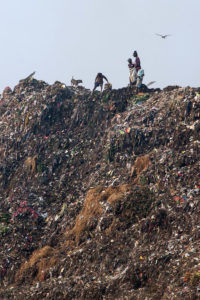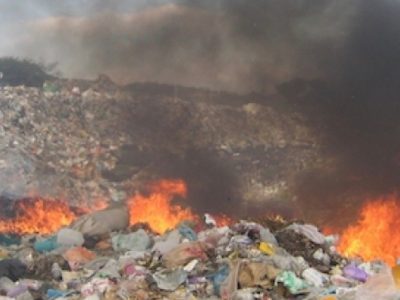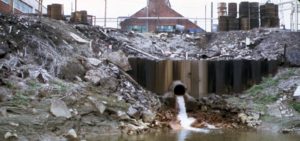Protect Soil, Water and Air
Generating a high amount of non-recyclable waste, we are causing pollution in the soil, water and air in various ways. By dumping non-biodegradable waste, we are blocking the soil to infiltrate water and other useful elements which also leads to waterlogging in the city areas. The untreated disposal of industrial wastes into the soil; has high toxic contaminants, which leads to soil pollution. Industrial wastes have a different amount of toxic contents and hazardous chemicals such that when deposited in soil, they affect the soil layer strength in the topsoil, thus reducing the soil fertility and biological activity of the soil. In addition to that, a hazardous effect leads to ecological imbalances, thus making trouble in crop production. Apart from that, it may cause severe health problems for those who are consuming such crops, because soil and crops are contaminated by toxic chemicals and hazardous materials.

Soil degradation caused by bumping excessive waste released between 3.6 and 4.4 billion tonnes of Carbon dioxide into the atmosphere and leads to climate change (Source). The toxic substances in air contaminated by waste also include nitrous oxide and methane. In everyday life, we identify the polluted air especially through bad odors, which are usually caused by decomposing and liquid waste items. Incinerating waste also causes problems, because plastics tend to produce toxic substances, such as dioxins, when they are burnt. Gases from incineration may cause air pollution and contribute to acid rain, while the ash from incinerators may contain heavy metals and other toxins. In the urban areas of Bangladesh, there produced about 175,988.68 tons of CO2e per month in 2005 and by 2014, it became 301,875.01 tons of CO2e approximately (Source). And this upward movement will be continuing if the waste management scenario remains the same.


Solid waste in the form of trash, litter, and garbage often ends up in these surface waters. Because surface waters collect in low-lying areas, anything that is dropped or blown into a watershed can eventually reach a drainage way. In both urban and rural areas, these items sometimes are illegally dumped directly into a waterbody or wetland, or deposited along riverbanks or lakeshores. Organic waste can have chemical and biological impacts on rivers and streams. Among the many impacts are interfering with the establishment of aquatic plants, affecting the reproductive behavior of fish and other animals, and depleting the water of dissolved oxygen as the wastes decompose. Further, toxic materials can leak or leach out of certain kinds of trash and create a fatal cause for both aquatic and terrestrial living beings by contaminating drinking water.

With the growing population, Bangladesh is generating immoderate waste every day and it is increasing with time. An excessive amount of waste generation causes increasing pollution in every sector. That’s why to live a healthy and pollution-free life, we all need to take the necessary steps to protect our soil, water, air, as well as the environment. We can protect our environment by-
- Encouraging a more eco-friendly model for the industry, farming and other economic activities.
- Improving urban and transport planning and wastewater treatment.
- Advancing the management of mining waste, restore the landscape and conserve topsoil.
- Most importantly, following the 4R o waste management, that is- Refuse, Reduce, Reuse and Recycle!
